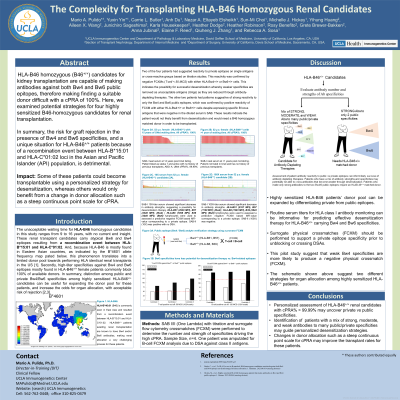The Complexity for Transplanting HLA-B46 Homozygous Renal Candidates
(P512) The complexity for transplanting HLA-B46 homozygous renal candidates
Location: Platinum Ballroom

Poster Presenter(s)
Aim: HLA-B46 homozygous (B46+/+) candidates for kidney transplantation are capable of making antibodies against both Bw4 and Bw6 public epitopes, therefore making finding a suitable donor difficult with a cPRA of 100%. Here, we examined potential strategies for four highly sensitized B46-homozygous candidates for renal transplantation.
Method: SA I/II (One Lambda) with titration and surrogate flow cytometry crossmatches (FCXM) were performed to determine the number and strength of specificities driving the high cPRA.
Results: Two of the four patients had suggested reactivity to private epitopes on single antigens or cross-reactive groups based on titration studies. This reactivity was confirmed by negative FCXMs (T-cell < 50 MCS) with either HLA-Bw4+/+ or Bw6+/+ cells. This indicates the possibility for successful desensitization whereby weaker specificities are removed as unacceptable antigens (UAgs) as they are reduced through antibody-depleting therapies. The other two patients had patterns suggestive of strong reactivity to only the Bw4 and Bw6 public epitopes, which was confirmed by positive reactivity of FCXM with either HLA-Bw4+/+ or Bw6+/+ cells despite expressing specific B locus antigens that were negative in the diluted serum’s SAB. These results indicate the patient would not likely benefit from desensitization and would need a B46 homozygous matched donor in order to be transplanted.
Conclusion: The risk for graft rejection in the presence of Bw4 and Bw6 specificities, and a unique situation for HLA-B46+/+ patients because of a recombination event between HLA-B*15:01 and HLA-C*01:02 loci in the Asian and Pacific Islander (API) population, is detrimental. Some of these patients become transplantable using a personalized strategy for desensitization, whereas others would only benefit from a change in donor allocation such as a steep continuous point scale for cPRA.
Method: SA I/II (One Lambda) with titration and surrogate flow cytometry crossmatches (FCXM) were performed to determine the number and strength of specificities driving the high cPRA.
Results: Two of the four patients had suggested reactivity to private epitopes on single antigens or cross-reactive groups based on titration studies. This reactivity was confirmed by negative FCXMs (T-cell < 50 MCS) with either HLA-Bw4+/+ or Bw6+/+ cells. This indicates the possibility for successful desensitization whereby weaker specificities are removed as unacceptable antigens (UAgs) as they are reduced through antibody-depleting therapies. The other two patients had patterns suggestive of strong reactivity to only the Bw4 and Bw6 public epitopes, which was confirmed by positive reactivity of FCXM with either HLA-Bw4+/+ or Bw6+/+ cells despite expressing specific B locus antigens that were negative in the diluted serum’s SAB. These results indicate the patient would not likely benefit from desensitization and would need a B46 homozygous matched donor in order to be transplanted.
Conclusion: The risk for graft rejection in the presence of Bw4 and Bw6 specificities, and a unique situation for HLA-B46+/+ patients because of a recombination event between HLA-B*15:01 and HLA-C*01:02 loci in the Asian and Pacific Islander (API) population, is detrimental. Some of these patients become transplantable using a personalized strategy for desensitization, whereas others would only benefit from a change in donor allocation such as a steep continuous point scale for cPRA.

